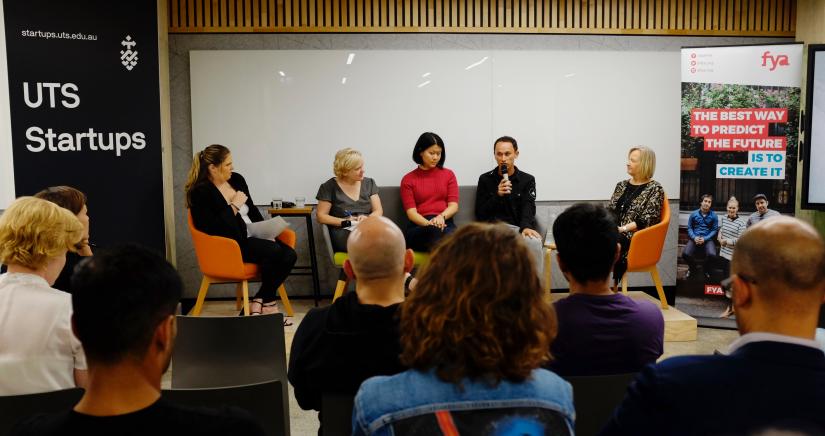How can social enterprise change the hearts and minds of a generation, and turn all businesses into businesses for the good of all?

Photo by Guy Degen.
Jan Owen’s description of using ‘bolt cutters’ to break into empty petrol stations in Brisbane, and repurpose ‘unused assets in the community’ for child care services, painted a vivid picture of her earlier career as a ‘guerrilla entrepreneur’ and pioneering social enterprise in Australia.
For the soon to be departing CEO of the Foundation for Young Australians (FYA), social enterprise is ‘an incremental step’.
“In the next 10 to 20 years, we won’t say ‘social entrepreneurship’. All businesses will flow to being something like social businesses, and we will have a new model such as ‘inclusive business’ where profit is shared.“
During a panel discussion at UTS to explore the Future of Young Social Enterprise, Owen said all businesses in the future should be “good businesses”. Businesses should be good for the environment, good for the community, good for our culture, and good for our economy
Social enterprise is at the heart of FYA’s youth social enterprise YLab. Under a new partnership between UTS and FYA, YLab is based within the thriving student-entrepreneur community of UTS Startups.
The panel also brought together Verity Firth, Executive Director of the UTS Centre for Social Justice and Inclusion; Andrew Akib, co-founder of UTS startup Maslow; Leanne Ong, YLab Associate; and was moderated by Mikaela Sutherland of Qantas and FYA Young Social Pioneer Alumna.
Owen said young people are seeking purpose and want to solve the problems created in our lifetime.
Since 2015 more than 66,000 school students have participated in FYA’s innovative $20 Boss program - the largest entrepreneurship program in Australia.
Through learning entrepreneurial skills “you can change the hearts and minds of a generation” said Owen.
“We are in a really powerful time in the world and it’s come with Gen Y.”
Tackling big issues together with business
The sort of mass movement to solve ‘wicked’ 21st century problems such as climate change needs a “much more collaborative, cross-sector process, and that means working with business,” said Verity Firth.
Firth argued the fundamental purpose of social enterprise is change, and a range of mechanisms can be used including business.
“Traditional paths of political pressure can not alone solve the immense problems we face. Every single element of society needs to be harnessed to actually deal with some of these wicked issues.”
“It also means making sure our young people, no matter what they are doing, have a really strong sense of social values and have their own agency to change things in the world,” said Firth.
Finding your tribe and success
For UTS Faculty of Arts and Social Sciences alumni and UTS Startups member, Andrew Akib, trying to explain to family and friends what he was interested in and what he was trying to do as a social entrepreneur was a struggle.
Akib’s startup, Maslow, is transforming the lives of young people with paralysis with their voice-recognition assistant.
Akib said if you want to explore social enterprise you should try to find places to surround yourselves with people who understand what you’re going through.
“I remember the first time I walked into the UTS Startups building and thinking, ’Oh hang on a second, I’d love to be among all these people as they are going to understand exactly what my startup is trying to do.’”
Social support is essential for young entrepreneurs starting out said Leanne Ong, especially if they are looking to do something unconventional with their social enterprise and combine “bits and pieces from different worlds”.
Ong explained that YLab equips young people with skills and provides organisations with the know-how to work productively and cohesively with young people long term.
“What we do is bridge the gap between young people who want to be involved in the decision-making process or program design, and organisations such as local councils, corporate clients or people who want to work with young people in a more full and fundamental way,” said Ong.
Success for social enterprise hinges on entrepreneurs sticking to their vision and values said Akib.
“I see a lot of people getting caught up in the fluff around funding and investing, and making that their end goal and forgetting some of their core values,” said Akib
Akib stressed the importance for entrepreneurs to constantly evaluate the impact they are trying to make.
A future of different social enterprise models
Looking into the future of social enterprise, panellists agreed on the importance to educate young people about social justice, social purpose becoming a natural part of doing good business, and social enterprise existing side by side with other forms of collective organisations.
Jan Owen says the development of social enterprise globally is rich and diverse, growing rapidly, and social innovation is challenging traditional concepts of businesses or services such as child care and aged care.
In Australia, some of the largest and most innovative social enterprises are already developing around early child care and around the National Disability Insurance Scheme, which Owen emphasises is the ‘biggest social infrastructure’ investment in our country in our lifetime.
With social enterprise beginning to be embedded in state government procurement policies, such as in Victoria, or at a federal government level for procurement to work with Indigenous social enterprises, Owen is positive not only about the future of social enterprise but about new models for businesses emerging in Australia.
To watch the full video of the panel talk, view here.

